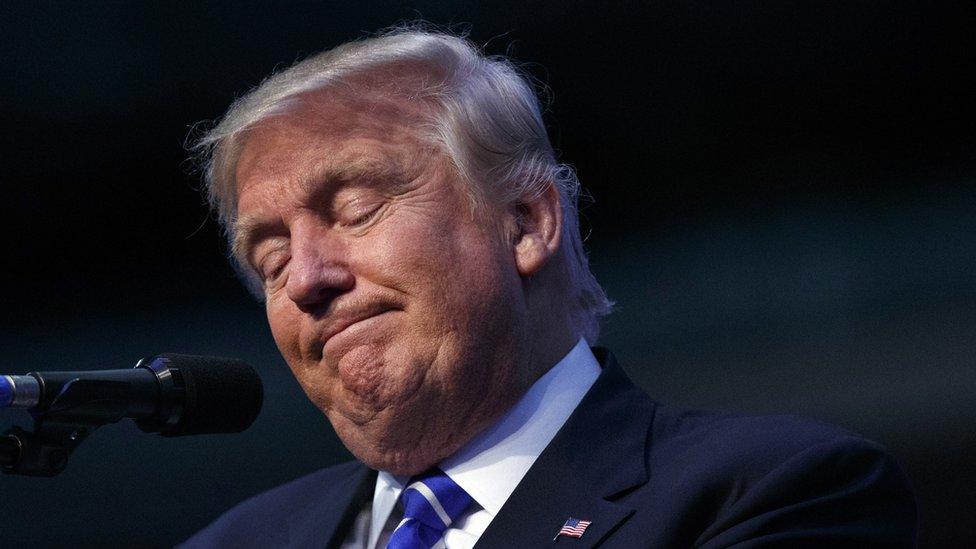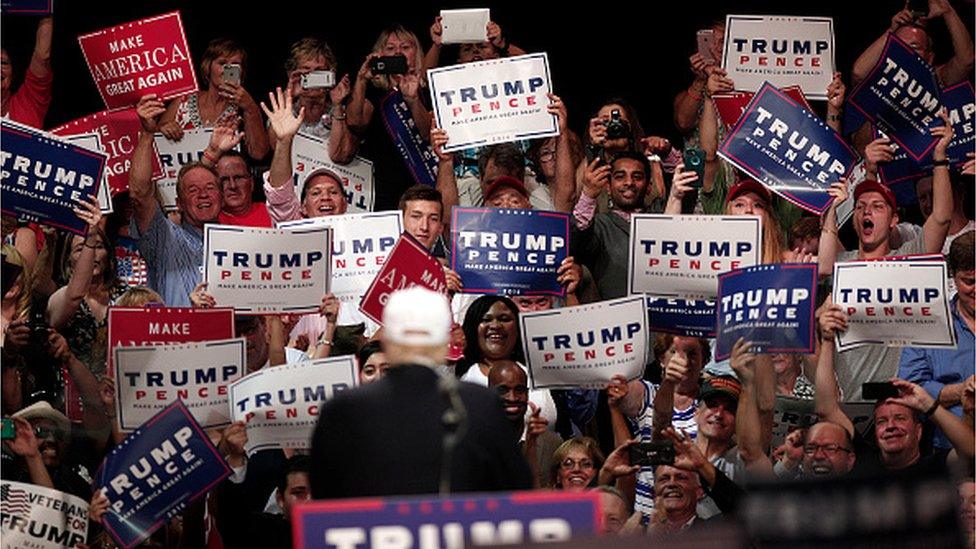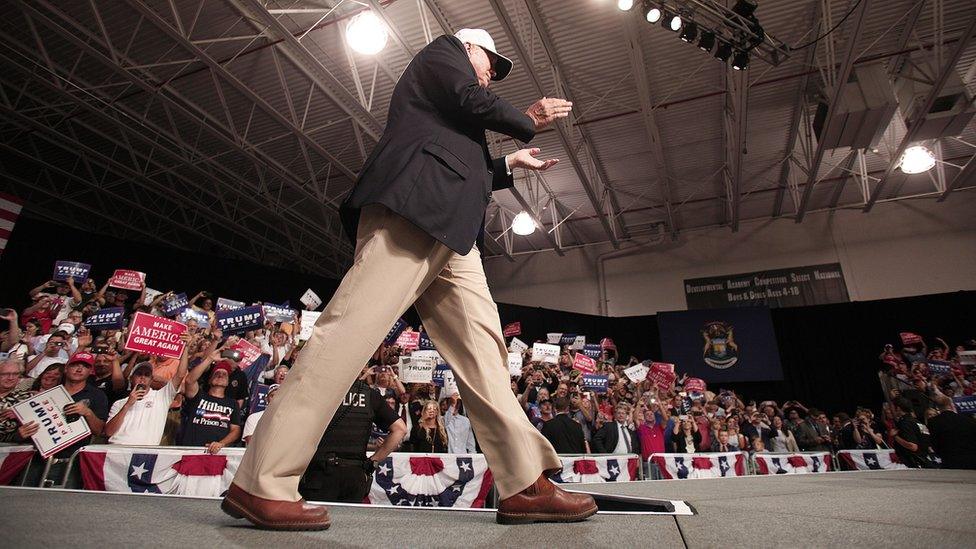Donald Trump's campaign fight-back
- Published

At times it feels that there is a daily political soap full of twists and sub-plots and it is called Donald Trump. There are firings and hirings. Words delivered and then withdrawn or explained away. The politician without regrets tries being sorry.
It can almost be awe-inspiring to watch; the attempted revival of Donald Trump. This was, until very recently, the freewheeling candidate who would not be polished or restrained. That was his badge of authenticity. He had scratched his way to the nomination by not being a politician.
Now buffeted by bad polls and a string of gaffes there is a pivot towards being more presidential. Or that is what is being said.
First to the so-called apology. Out of the blue, Donald Trump told an audience that "sometimes in the heat of debate… you don't choose the right words or you say the wrong. I have done that and believe it or not, I regret it and I do regret it particularly where it may have caused personal pain".
The regret caught everyone out. What it meant was hard to say and that, you could argue was its point. It was a politician's apology. There was no list of people who he regretted causing pain to. It was just a regret floating out there.
Secondly there is the pitch to African-American voters. Up until now they have not been a feature of Mr Trump's campaign.
Only 2% of them say they'll vote for him. Now, he says he is asking every African-American voter to back him. Why? He says that their communities are failing and that the Democrats harvest their votes but do nothing about poverty and violence. "What else have you got to lose?" he asks them. Some bristled at the generalisation that their communities were broken.
But here's the question. Was this appeal directed at African-Americans? It was made in front of an almost entirely white audience. Is Donald Trump truly expecting to win more black votes or is he trying to make himself more acceptable to white voters?

To succeed, Trump must appeal beyond his core supporters
In this dizzying week of change, he declared that the Republican Party is still the party of Abraham Lincoln.
Thirdly there is immigration. Mr Trump built his campaign on being able to root out 11 million undocumented migrants and to build a wall along the Mexican border. At his rallies, the chants of "build the wall" still ring out. But, here too, there may be a softening. Suggestions that he might build a deportation squad might be quietly dropped because "deportation is neither possible or humane".
Then, white cap pulled down over his face so you couldn't see his eyes, he turns up in the flood-lands of Louisiana. He lifts a few supplies from a truck and has some luck with his timing; he is with flood victims while President Obama is playing golf. It's a photo opportunity but it's what presidential candidates normally do.
From the sidelines, his new team applauds. They declare he has enjoyed "the best week of his campaign". The chairman of the Republican Party Reince Priebus says: "I think he has been on message. He's shown maturity as a candidate. I think he's getting into a groove. I think he likes the new style."
His top advisers, some of whom have been in place for less than a week, do not disguise their strategy. The trick is to allow Donald Trump to be authentic, to be himself, while at the same time revealing him as a politician of substance. And that means sticking to scripts and reading from auto-prompts.
The key to the plan is to stop the campaign being about Donald Trump's tone and his personality and his character. If that remains the story then Hillary Clinton wins.
His party, of which he is the de facto leader, is watching with some scepticism this attempt to cast Mr Trump as more presidential. More senior figures in his party are on the edge of deserting him. Another string of gaffes or a further slide in the polls and there are some who will demand that funds are switched from the Trump campaign to securing Republican seats in the Senate and in Congress. It is the Republican defensive strategy.
There are factors on Mr Trump's side. His basic message that blue-collar Americans and the aspiring middle class have been left behind by globalisation resonates. The sense that the political system is rigged against ordinary people won him votes in the primaries and can win him more votes again.
His core vote has held up well through all the controversies.
Then there are the unknowns that can intrude on any campaign; the incidents, the international events.

Donald Trump is still lagging in key polls
His opponent Hillary Clinton is widely mistrusted. She has a much bigger team - 700 staff - and is outspending the Trump campaign. She talks in detail about creating jobs and repairing the nation's infrastructure and yet there is little excitement surrounding her campaign. It is almost as if there is Clinton fatigue.
And then there is the opportunity of the debates. The first one is on 26 September and may well be the most-watched debate in American history. It could be a game-changer for either candidate.
For the moment, Mr Trump is lagging behind by at least 5% in the poll of polls. No candidate in recent times has come back from being so far behind.
Can Donald Trump sell himself as the learning and maturing candidate? F Scott Fitzgerald wrote that "there are no second acts in American lives". Many people believe that Trump has already defined himself, that an attempt to make him more presidential rings hollow and that sooner rather than later the attempt at discipline will slip.